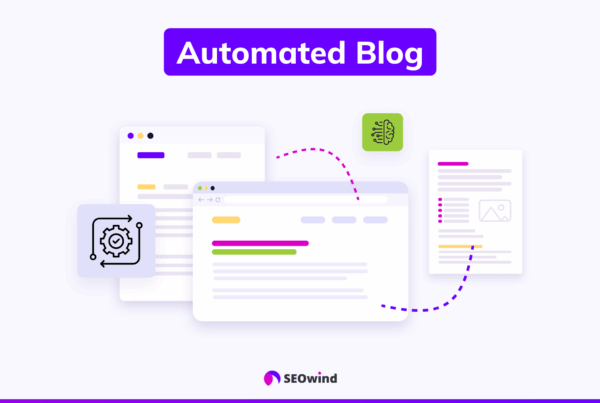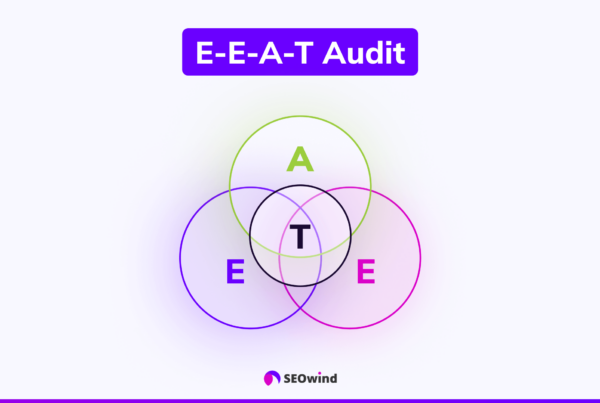AI-powered tools are transforming how we compose, edit, and optimize text. One such tool that’s gained attention is Writesonic. However, there is a growing number of advanced alternatives for AI writing. So, if you’ve been exploring Writesonic and others like AI writing tools to supercharge your writing process, stick with me as I discover the best Writesonic alternatives and competitors to use in 2024.
What is Writesonic?
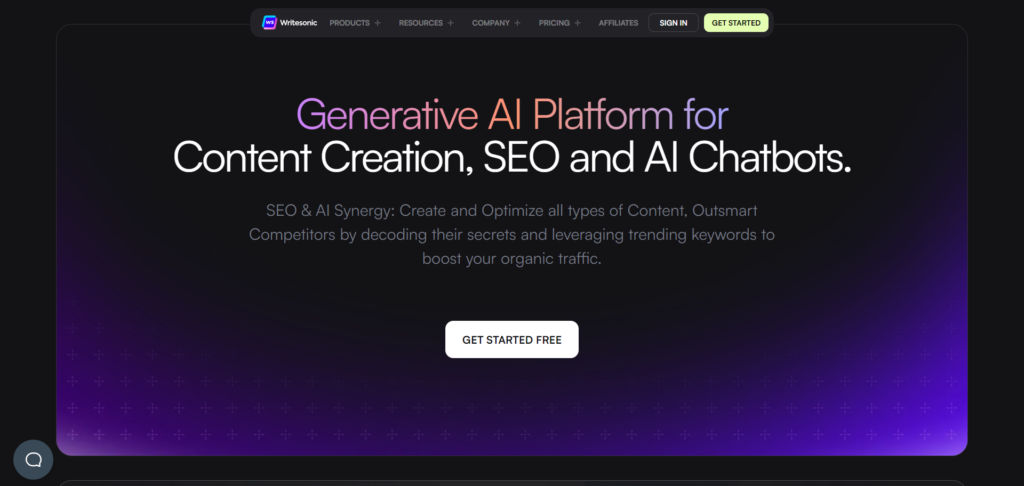
Writesonic is a generative AI platform for content creation, SEO, and AI chatbots. This platform effortlessly creates high-quality copies for ads, emails, websites, blogs, and product descriptions – you name it!
Ah! But here’s where it shines – bragging rights include language versatility with support for over 20 languages. Plus, built-in SEO optimization ensures your articles resonate with audiences and search algorithms.
What distinguishes Writesonic from vanilla text editors? Well, imagine having a professional copywriter at your service around the clock – without coffee breaks or writer’s block. That summarizes what Writesonic has on display: efficiency-maximized and creativity-enhanced writing.
Now, let’s dive deeper into why one might be enticed to explore alternatives to this seemingly potent writing pillar.
Writesonic main features and benefits
Writesonic, an AI-powered writing tool I have experience with, is designed to ease content creation. Let’s delve into its comprehensive features and benefits:
1. Automated Content Generation
With Writesonic, creating blog posts, product descriptions, or ad copies is as easy as entering a few keywords. The platform leverages advanced language models to craft engaging and SEO-optimized content automatically.
2. Readymade Templates
To start creating content with Writesonic, one just needs to pick from their extensive library of pre-designed templates. Whether you’re drafting social media posts or email newsletters, these templates act as excellent springboards for your creative process.
3. GPT-4-32K Powered
If you’ve been wracking your brain about ‘What makes Writesonic so special?’ – it’s GPT-4-32K! With this cutting-edge technology developed by OpenAI, Writesonic can mimic human-like writing qualities and deliver unique, top-tier content within seconds.
4. Multiple Language Support
Extending reach beyond English-speaking audiences has never been easier with Writesonic, which supports up to 24+ languages.
5. Simplified Features for Better User Experience
The user interface offered by Writesonic is sleek and intuitive. Even users who aren’t tech-savvy can navigate through the platform without any hassle due to its friendly design ethos.
6. Elevated Time Efficiency
Time is a commodity that we continuously find ourselves chasing. Writesonic significantly reduces the hours spent on research and content drafting. The difference it makes, especially for content teams and marketing departments, transforms productivity rates and deadline achievements.
7. Cost-Effective Solution
With budget constraints often dictating the opportunities a business can seize, Writesonic presents an affordable alternative to hiring a team of professional writers, starting at just $13 a month. This makes it highly appealing for small businesses and startups.
In a nutshell, what differentiates Writesonic from other AI tools in the market is its robust selection of feature offerings paired with exceptional usability. With such utilities at your fingertips, content generation becomes less daunting and more fun. And when our work turns into play – we always perform better!
Writesonic Reviews
It’s always important to consider reviews when researching new tools. Let’s dive into some user experiences with Writesonic.
| Writesonic Pros | Writesonic Cons |
|---|---|
| User-friendly Interface | The Missing Human Touch |
| Impressive Content Variety | Limited Customization Options |
| AI-Optimized Content | Inconsistent Long-form Quality |
| Multi-language Support | Pricing Structure |
| Content aligned with your brand | Subpar Performance on Niche Topics |
| Time-Saving Features | Occasional Bugs or Glitches |
| Adaptability | Repetitive Word Usage |
Writesonic Pros
Writesonic, without a doubt, has become a highly-respected content creation tool in the industry. I’ve seen plenty of individuals praising it, from startup founders to marketing communities.
- User-friendly Interface: Users rave about their sleek design and intuitive interface, which makes navigation painless.
- Impressive Content Variety: Its ability to create unique content, such as blog intros, product descriptions, and even full-length articles in mere minutes, is remarkable.
- AI-Optimized Content: Reviewers appreciate how Writesonic uses sophisticated AI technologies like GPT-4 from OpenAI and integrates with Semrush and Surfer, ensuring your content reads well and is optimized for search engines.
- Multi-language Support: The cherry on top? It supports over 24 languages – quite a leg up for any brands aiming at global reach.
- Content aligned with your brand: you can upload documents and PDFs and add links to your previously written blogs to teach Writesonic to write in your own brand voice.
- Time-Saving Features: Offers time-saving features that allow users to create content and manage automated workflows efficiently
- Adaptability: Users can input specific guidelines to ensure the generated content aligns with their specific requirements, enhancing customization
Writesonic Cons
However, this tool may have its challenges, too.
- The Missing Human Touch: The drawback of an AI-driven approach is the absence of emotional depth and creativity that only human writers can infuse into the content. Writesonic, despite its capabilities, cannot replicate these nuances.
- Limited Customization Options: Some users voice dissatisfaction with the limited adaptability concerning the tone and style of output text.
- Inconsistent Longform Quality: When generating longer pieces of text, some find that the quality can be hit-or-miss; editing may still be needed in certain instances.
- Pricing Structure: Several reviewers expressed concerns about its somewhat high pricing structure, especially compared to competing services offering similar features.
- Subpar Performance on Niche Topics: When it comes to specialized subjects demanding deep industry knowledge, Writesonic may stumble. Here, the finesse of a human expert can vastly outshine AI-generated content.
- Occasional Bugs or Glitches: Some users have reported occasional bugs or glitches in the software, which can affect the user experience and workflow efficiency.
- Repetitive Word Usage: Writesonic tends to use similar words and sentence structures, which might be noticeable to individuals familiar with AI-generated content.
Keeping these pros and cons in mind will help you decide whether Writesonic or perhaps another tool might better serve your writing needs as we dig deeper into additional alternatives below!
Why users might consider Writesonic alternatives?
Despite being power-packed with features designed to streamline the writing process at a large scale, every rose comes with thorns. Users may consider alternatives due to some drawbacks associated with Writesonic:
- Cost-effectiveness – Although offering various pricing plans accommodating multiple usage types, they might not align well with everyone’s budget limits.
- Customization limitations – While generating appealing content quickly is its core, sometimes you may desire intricate control over tonality or style specifics, which Writesonic may slightly falter with.
- Over-dependence on AI – The absence of a human touch can sometimes lead to content that might seem bland or devoid of subtle, empathetic undertones.
Having acknowledged why users might seek alternatives to Writesonic, let’s explore some dynamic contenders becoming popular in 2024.
What are the best Writesonic Alternatives and Competitors?
Numerous Writesonic alternatives on the market today offer a range of capabilities and advantages. Each platform brings distinct features to satisfy different tastes and needs in content creation processes.
Here, I’ve compiled a list of strong contenders who can undoubtedly give Writesonic a run for its money:
- SEOwind: This alternative excels in producing SEO-optimized quality articles. It’s an AI-powered tool perfect for those serious about ranking high on search results.
- Anyword: If you’re after data-driven copywriting, Anyword heads the pack. Its algorithms work wonders in generating precise content based on user-provided inputs.
- ChatGPT: Leaning towards conversational content? ChatGPT shines here with realistic dialogue simulations.
- Copy.ai: Dubbed a comprehensive writing assistant, Copy.ai provides diverse writing models catering to any type of content you require.
- Frase.io: If advanced AI capabilities make your heart beat faster, Frase.io will not disappoint! It effectively balances human input and artificial intelligence for dynamic text output.
- Grammarly: No list would be complete without Grammarly when it comes to grammar enhancements; this platform remains unbeaten, ensuring error-free polished content every time.
- Jasper AI: Users looking at effortless creativity in their write-ups may find solace in Jasper AI, which fuels convenient creative content generation.
- Rytr: As an excellent choice for high-volume quality content production, Rytr steps up through bulk outputs without compromising the text’s value.
- Scalenut: For those who prefer to outsource their quality content requirements, Scalenut serves as a reliable partner equipped with professional skills and resources
- Wordtune: Favorite among users wishing refined written text outputs, Wordtune brushes through your drafts, removing unnecessary rough edges and ensuring you get a well-polished piece of content.
Each one of these platforms has its strength and unique selling proposition. The best choice will vary based on your specific needs and objectives. So, take some time to explore each platform further before making your decision.
SEOwind – Ideal for SEO-Optimized Quality Articles
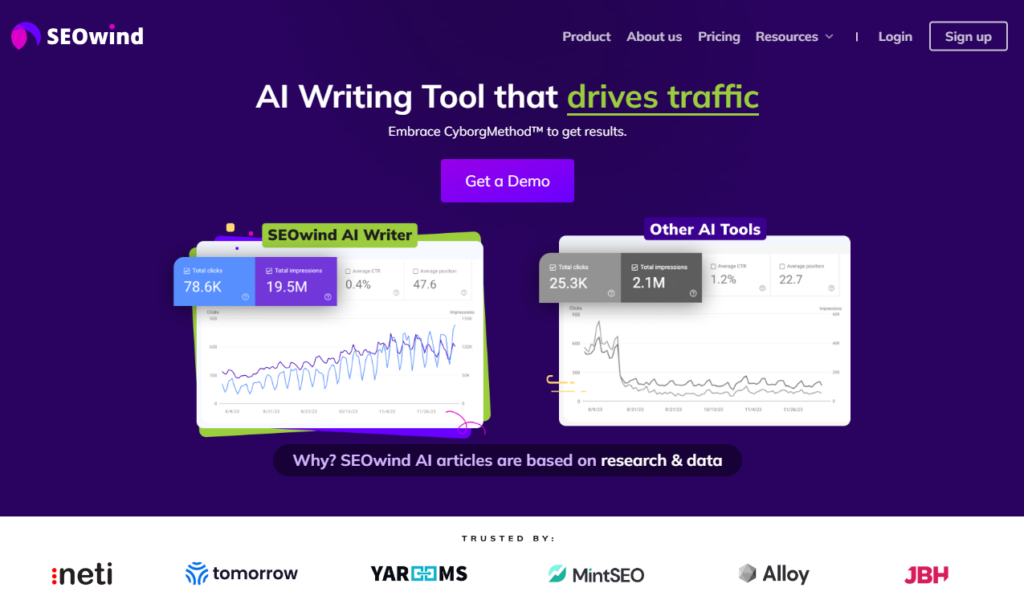
SEOwind Key Features and Benefits
If you’re looking for superior content generation software, one standout Writesonic alternative is SEOwind. Let’s delve into its main features:
- Advanced AI-powered Content Creation: With the assistance of cutting-edge artificial intelligence, generating high-quality content becomes as easy as pie.
- Precision-Tuned SEO: Forget about endless hours studying Google algorithms; let this intuitive software lend a hand in making your content highly digestible for all search engine optimization (SEO) aspects.
- Unparalleled Research Tools: Worried about competing in your arena? You don’t have to be with SEOwind’s powerful research tools that simplify niche analysis and make it easier than ever to understand your competitors’ strategies.
- Make AI content unique: With its advanced features for customizing brand voice, adding internal links, and enriching the content with quotes and statistics, SEOwind AI articles are high quality.
SEOwind Use Cases
Now that we know what sets SEOwind apart, here are some typical applications of this software:
- Content Marketing: With automated writing tools, businesses can save considerable time on content marketing efforts without compromising quality.
- Fast-Paced Blogs & News Sites: For those running blogs or news portals where speed matters, this tool creates posts quickly while maintaining robust standards.
- Website Optimisation: Profiting from precision-tuned SEO tools means even smaller websites can gain a competitive edge.
Why Choose SEOwind as a Writesonic Alternative?
There’s no denying Writesonic has many strong points. However, there’s always room for finding better solutions tailored to individual business needs, which brings us to our core question: Why pick SEOwind over Writesonic?
Here’s why:
- If increasing web traffic is your ultimate desire, then advanced content and keyword research done by SEOwind create an overwhelmingly compelling argument – something missing in Writesonic.
- SEOwind gets you high-quality, long-form AI articles with your brand voice, internal links, and relevant stats. Whereas Writesonic is much better for writing short-form content.
- Lastly, the ample embedded SEO mechanisms in SEOwind ensure your content will effortlessly reach larger audiences, thus boosting your visibility.
So, if you are shooting for digital dominance in an indicative and comprehensive way while keeping SEO at its core, it’s worth considering SEOwind as a prospective Writesonic alternative.
Anyword – Perfect for Data-Driven Copywriting
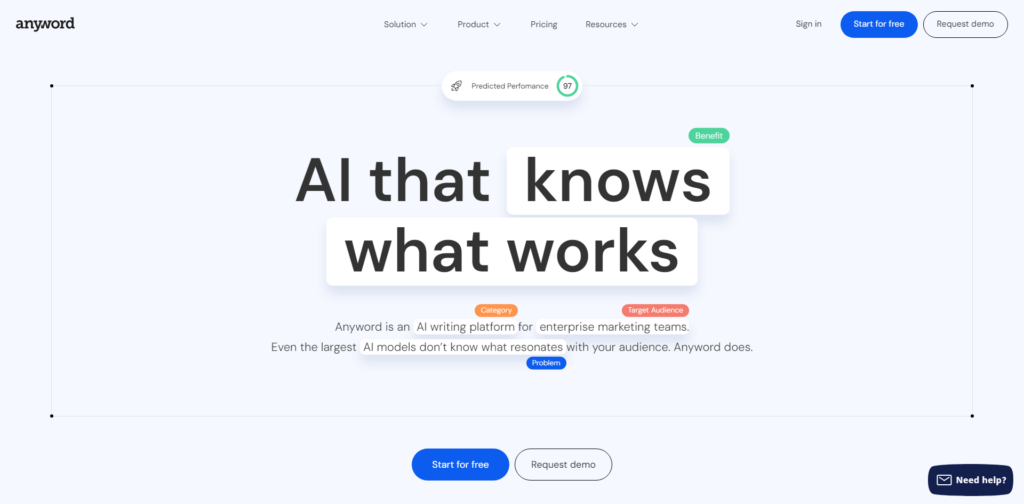
Evolving content needs require advanced solutions; one such solution is Anyword, a platform that has etched its powerful presence in data-driven copywriting. Beyond simply putting words on screen or paper, it accentuates the strategic power of well-crafted content through data-driven inputs.
Anyword key features and benefits
Anyword offers a host of impressive features advantageous to all types of writers:
- Predictive Performance Score: This feature helps you understand how your text might perform before publishing, offering an edge in content creation.
- Multiple Language Support: It supports over 20 languages, a truly global tool!
- In-depth User Behaviour Analysis: Anyword analyzes your audience’s behavior and tailors personalized text suggestions to boost engagement.
The benefits are clear: improved writing efficiency, better connection with readership across the globe, and enhanced article performance predictions all contribute to refined copywriting strategies.
Anyword Use Cases
Anyword finds its relevance across various fields:
- Firms use it to create engaging social media posts and ads.
- E-commerce companies use it for crafting persuasive product descriptions.
- Bloggers optimize their articles based on Anyword’s analytics.
Not limited to specific audiences or sectors, this application accommodates individual writers as much as bustling agencies seeking increased efficiency and superior results thanks to innovative machine-powered capabilities.
Anyword vs Writesonic: Key Differences
Identifying differences between similar platforms like Writesonic and Anyword can seem a bit arduous, but combing through them reveals three primary distinctions:
- Purpose: Writesonic is an AI-powered writing assistant designed to empower users to write anything and publish it anywhere, while Anyword is a PPC software that helps businesses utilize artificial intelligence-enabled tools to create and optimize ad copies.
- Performance Prediction: Unlike Writesonic, Anyword offers predictive scores on text performance, an insightful feature that guides your writing efforts toward specific outcomes.
- Personalization Level: While both tools offer AI-powered assistance, Anyword pushes boundaries with user behavior analysis, enabling highly tailored content creation.
- Content Creation: Writesonic offers a wide range of content creation tools, including blog posts, product descriptions, and more, while Anyword focuses on short-form content like ad copies and social media posts
- Language Support: Anyword provides a more extensive language base than Writesonic.
Writesonic is more versatile in content creation and offers a broader range of templates, while Anyword is more specialized in creating short-form content for marketing purposes.
ChatGPT – Best for Conversational Content
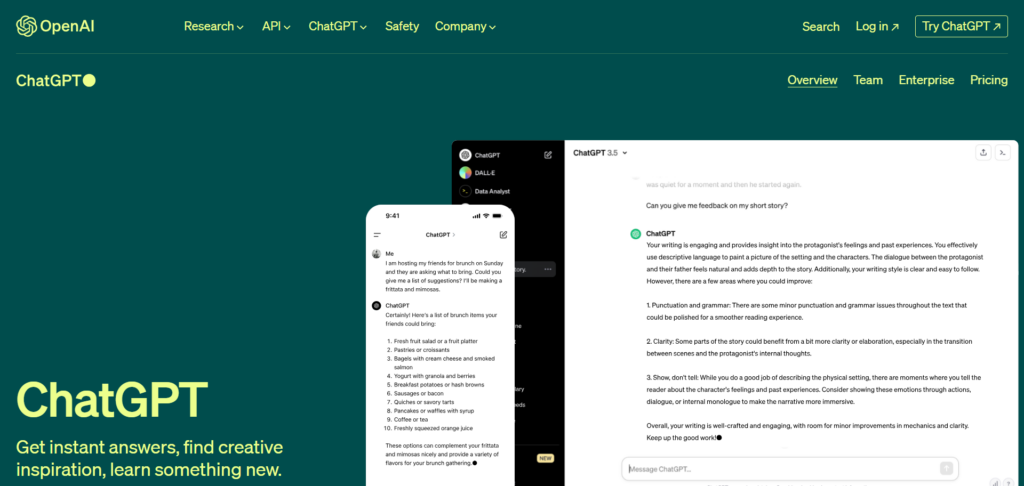
ChatGPT shines bright when it comes to striking a comfortable and conversational tone in content. A brainchild of OpenAI, ChatGPT’s impressive text generation capability is transforming the face of digital copywriting and marketing.
ChatGPT Key Features and Benefits
One of the standout features of ChatGPT is its ability to maintain an impressively natural conversation flow. This functionality is key in creating engaging dialogues with readers. Also, let’s not forget its AI-powered language model that comprehends complex human inputs effectively and returns accurate outputs.
The strength of ChatGPT lies in its grand-scale training across a wide variety of internet texts. Hence, adapting to multiple styles or tones doesn’t challenge this remarkable tool, regardless of your target audience’s preferences.
Another merit worth noting is the time efficiency associated with using ChatGPT. You’ll say goodbye to long hours hunched over your computer crafting perfect emails or articles. Once you feed your instructions clearly into the system, it churns out high-quality text within minutes.
ChatGPT Use Cases
ChatGPT has found diverse application avenues due to its versatility:
- It’s widely used in crafting customer service responses and addressing FAQs while maintaining personalized communication.
- This tool excels at drafting engaging blog posts that hook readers from start to finish.
- Screenwriters have found a use for ChatGPT by generating intriguing dialogues complementing their storytelling endeavors.
Simply put, if captivating audience engagement via conversational content tops your list, then ChatGPT may be just what you need.
Chatgpt vs Writesonic: 3 Key Distinctions in Writing
- Content Tone: While both tools cater adeptly to content creation needs, there’s a key difference in writing style. On one hand, Writesonic leans more towards professional and business-oriented writing. On the other hand, ChatGPT steals the limelight when it comes to producing content with a more relaxed and conversational tone.
- User Input Flexibility: Writesonic tends to necessitate definite guide points or inputs from users for desired outputs, whereas, in contrast, ChatGPT handles ambiguous user prompts with greater proficiency.
- Artificial Creativity: While both engines boast laudable AI capabilities, you may find that ChatGPT often provides a more creative touch, thanks to its expansive learning over an eclectic bundle of internet text.
Surely, determining whether ChatGPT trumps Writesonic boils down to individual needs and preferences. However, engaging in dialogue or conversational content is your primary call; ChatGPT’s innovative natural conversation flow could be worth exploring.
Copy.ai: A Comprehensive Writing Assistant

Copy.ai is an AI-powered platform that is a mighty tool for content creators, business owners, digital marketers, and anyone seeking to amplify their writing with machine-based intelligence.
Copy.ai Key Features and Benefits
So what makes Copy.ai such an effective Writesonic substitute? Let me delve into the unique features and benefits that make this tool stand tall.
- The breadth of Application: With Copy.ai by your side, you can sail through any kind of writing task – be it creating social media captions, blog introductions, or product descriptions.
- Creativity on Tap: When writer’s block strikes, Copi.ai becomes your creative ally, suggesting new ways to formulate sentences and assisting you in developing fresh ideas.
- Human-like Tone: Don’t panic! This isn’t just another robotic content generator. Instead, the syntax output from Copy.ai replicates a warm ‘human’ voice, aiding in maintaining authenticity in communication.
- Time Saver: By automating many aspects of the content creation process, Copy.ai helps save hours, thereby increasing productivity levels.
- User-friendly Platform: Easy-to-navigate interface with well-organized tools promises a seamless user experience.
Copy.ai Use Cases
Wondering where exactly could you put this little silicon genius to work? Here are a few applications:
- Crafting catchy email headers that drive up open rates.
- Generating creative ad copy lending roaring success to marketing campaigns.
- Constructing effective SEO Meta Descriptions promoting higher rankings in search results.
- Penning persuasive product descriptions stimulating sales prospects
Now, let’s look at how it stacks up against Writesonic.
Copy.ai vs Writesonic: 3 Key Differences
Here’s the distilled version of how these two powerful platforms diverge in capabilities:
- Scope of Applications: While both tools cater to many writing tasks, Copy.ai edges ahead with more diverse applications, including broader digital marketing collateral.
- User Interface: Sample this – Writesonic has a simpler design, whereas Copy.ai has an extensive feature set, making it a tad denser. Yet, I shouldn’t miss noting that Copy.ai’s organized UI layout makes the navigation quite straightforward, even for beginners.
- Cost-Effectiveness: Price-wise, you may find Writesonic is on the higher-end spectrum compared to its counterparts like Copy.ai, which offers competitive pricing packages suited for different user types – solo entrepreneurs or large teams.
For some users, Copy.ai can be a good Writesonic replacement. So, if you’re looking for one, it might be worth giving it a spin.
Frase.io: Empowering Writers With Advanced AI Capabilities

Every AI writing tool has its collection of strengths and specialties. Frase.io, in particular, has made a name for itself by empowering writers with advanced artificial intelligence capabilities. Let’s tour this fascinating platform to discover its key features and potential use cases.
Frase Key Features and Benefits
Frase brings several exciting attributes to the table:
- AI Content Briefs: This intelligent feature generates exhaustive briefs about any desired topic, giving an ultimate headstart to your content adventure.
- Intuitive Content Editors: Revamp your content strategy with editable documents and helpful SEO suggestions.
- Question Suggestion Engine: Write more meaningful content by answering trending questions that Frase provides around your topic.
- Competitor Analysis Tool: Keep an eye on your competitors’ strategies as you develop unique, high-quality articles.
These features collectively assist writers to make their pieces stand out and rank higher on search engines.
Frase Use Cases
Comprehending use cases can help in understanding how versatile a tool like Frase is:
- Content Marketers & SEO Professionals can benefit greatly from the robust analytics provided by Frase’s smart technological edge.
- Bloggers & Journalists will find invaluable assistance crafting immersive stories driven by data-led insights.
- Business Owners attempting to boost their online presence through insightful blog posts or product descriptions can leverage Frase’s strong AI-powered guidance.
These possible scenarios are only the tip of the iceberg when exploiting what Frase offers!
Frase vs Writesonic: 3 Key Differences
Now, although both tools have commendable merits and serve similar purposes, let’s scrutinize three fundamental differences between them:
- Notably, Frase emphasizes heavily on SEO-driven text creation, making it ideal for creating web content with calculated keyword usage. In contrast, Writesonic’s approach leans more towards producing engaging marketing copy.
- While both platforms provide AI-generated content edits and suggestions, Frase includes a unique feature that presents trending questions around your topic to align better with user searches.
- Lastly, Frase’s AI Content Briefs offer a coherent groundwork for writers. This valuable attribute is one that I haven’t found in the same depth and accessibility within Writesonic.
Grammarly – Unbeaten for Grammar Enhancements

When speaking about top-notch quality in grammar corrections, it’s hard to overlook the profound presence of Grammarly. This AI-powered tool has tailored itself into a seemingly invincible champion for any content creator wanting to achieve impeccable grammar and polished prose.
Grammarly Key Features and Benefits
Grammarly goes beyond basic spell-check. It stands out due to its distinctive capacity for advanced grammar, punctuation, and syntax error detection across various document formats. Moreover, it provides detailed explanations for each correction, which serves as a mini-grammar lesson.
This exceptional software also offers stylistic suggestions based on the tone you want your writing to reflect. By supporting rephrasing and providing synonyms that maintain context relevance, Grammarly maneuverably assists in refining readability and coherence.
Last but not least comes the plagiarism detection feature, an essential trait that smartly cross-references your work with millions of web pages to ensure originality.
Grammarly Use Cases
Broad functionality enables diverse usage scenarios:
- From bloggers aiming to enhance their posts’ quality;
- To help students improve their research papers;
- Professionals create business reports or craft persuasive marketing copies.
Essentially, anyone who frequently engages in writing can rely on Grammarly as an empowering companion striving towards faultless articulation.
As a writer who toggles between different registers: the casual parlance of my blogs, academic discourse for journal submissions, and marketing jargon when I script advertisements – I found this tool steadfast amidst varying challenges.
Grammarly works especially well by catching errors slithered unnoticed by human eyes while ensuring smooth flow within sentences – achieving both finesse & accuracy in written texts.
Grammarly vs Writesonic: 3 Key Distinctions in Article Writing
While comparing two titan tools like Betafish WriteSonic (our primary focus thus far) and Grammarly might seem arduous, some discernible differences emerge when gauging them from an article writing perspective:
- Primary Function: Grammarly excels in perfecting grammar and enhancing readability. Writesonic’s strengths lie primarily in generating fresh content based on textual input.
- Writing Assistance: Although both tools deliver suggestions for improving writing, Grammarly certainly outpaces Writesonic on this front due to its comprehensive assistance of rephrasing awkward sentences, improving structure consistency, and providing word-choice alternatives.
- Plagiarism Checker: Lastly, temporary writers often grapple with unintentional plagiarism. Grammarly provides a lifesaving feature that swiftly matches the written text against multiple online sources to ascertain originality – a tool not typically observed in most AI writing platforms, including Writesonic.
Recognizing these distinctions tailors your journey towards selecting the apt tool aligning with your unique article-writing needs. While both products augment the quality of any content piece, their utilities differ significantly, making one potentially more suitable than the other in distinct scenarios!
Jasper AI – Top for Effortless Creative Content

When delivering high-quality, creative content with minimal effort, the spotlight shifts towards an astounding tool called Jasper AI. This artificial intelligence-based platform gives a whole new perspective to content creation by transforming your ideas into compelling narratives.
Jasper Key Highlights and Benefits
Let’s take a quick look at what sets Jasper apart from its counterparts:
- Automated Creativity: With advanced algorithms, Jasper can automatically compose catchy headlines or entire blog posts, unlocking unparalleled convenience.
- Customization Controls: It provides you with preferences such as tone of voice, length, and specificity, allowing you greater control over your output.
- Multilingual Expertise: Whether in English or Spanish, French or German, Jasper is remarkably adept at creating convincing copy in multiple languages.
Use Cases of Jasper AI
The versatility of Jasper extends beyond blogging and into several other domains, including:
- Crafting engaging social media posts
- Personalizing emails for marketing campaigns
- Generating product descriptions that captivate potential customers
- Constructing SEO-focused blogs without compromising readability
3 Major Differences Between Writesonic and Jasper AI
It’s essential to make informed decisions when choosing between tools like Writesonic and Jasper, so let me give some insights on their key variations:
- Pricing structure: While Writesonic’s charging system revolves around credits per word count and usage, with credits expiring after a certain period, Jasper works on an unlimited-use basis within the limits of the subscribed plan.
- AI strength: The nuanced creativity within each sentence constructed by the versatile artificial brainpower of Jasper is often seen as outperforming what Writesonic offers.
- Post-writing assistance: Unlike Writesonic, which focuses more on generating text output based on templates given, Jasper refines those outputs with keyword suggestions and grammar enhancement capabilities, making it highly preferred by writers for their assistance in the writing process.
- Integrations: Jasper AI has more integrations, such as Surfer SEO and Grammarly, while Writesonic has more integrations with WordPress and Semrush.
Understanding these differences can help you select the right AI content-creation tool for your needs. It’s about finding the one that understands your style and helps you bring out your literary voice, further enhancing your connection with readers. In this instance, Jasper AI seems to excel!
???? Want to learn more about how Jasper AI differs from Writesonic? Go to the dedicated Writesonic vs Jasper AI comparison. You’ll find an up-to-date list of features, pricing, and G2 ratings.
Rytr – Excellent for High Volume Quality Content
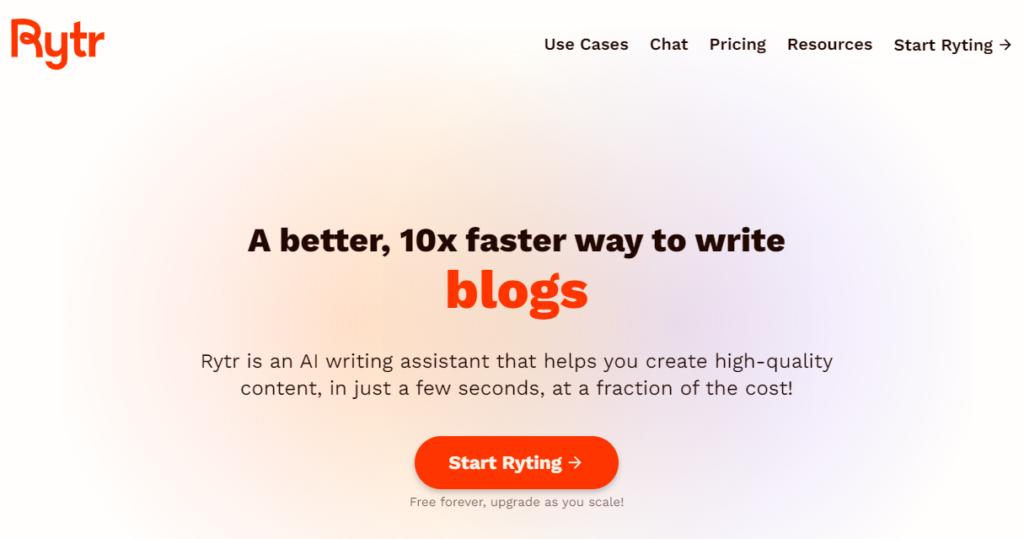
Rytr is a fine blend of innovative technology and creative writing, allowing you to churn out superior-quality content in large volumes. Not only does it help provide engaging narratives, but its artificial intelligence system also assists in creating fascinating blog posts, crisp social media updates, and convincing sales pitches.
Rytr Key Features and Benefits
Every tool has something unique to offer, so let’s dive into what makes Rytr stand apart:
- Human-like Writing: Through advanced AI technology, Rytr can generate human-like writing, which reduces the need for extensive modifications.
- Variety of Tones: You can experiment with different tones, such as formal, witty, or friendly, based on your requirements.
- Aspires Simplicity: The user interface is intuitive and efficient, making it hassle-free for beginners to navigate the platform.
Rytr allows individuals and businesses to maintain a consistent output while ensuring cost efficiency.
Rytr Use Cases
Furthermore, the best way to truly appreciate Rytr’s capabilities is by understanding its practical applications:
- Influencers & Bloggers: Automating blog post creation with varying tones suitable to the target audience.
- SMEs & Startups: Saving crucial time by producing copies for marketing communications like emails and social media posts.
- Sales Professionals & PR Executives: Crafting persuasive corporate communication materials quickly.
Indeed, understanding these use cases should establish the immense potential that comes hand in hand-with using Rytr.
Rytr vs Writesonic: 3 Key Differences
To round up this section, I’ll highlight three critical differences between Writesonic and RytR:
- Features: Rytr offers a wider range of features, including native SEO integration tools, native plagiarism checkers, and AI-assisted content optimization.
- User Interface: Writesonic might require a slight learning curve, while Rytr’s interface focuses more on simplicity and usability.
- Content Types: While both tools create multiform content, Rytr has the added advantage of crafting sales pitches.
To conclude, if you’re after a straightforward tool that provides high-volume quality content and is user-friendly, then Rytr can be a good Writesonic alternative to consider.
???? Want to find out more about how Rytr differs from Writesonic? Go to the dedicated page Writesonic vs Rytr comparison. You’ll find an up-to-date list of features related to AI writing, pricing, and G2 ratings.
Scalenut – Great for Outsourcing Quality Content
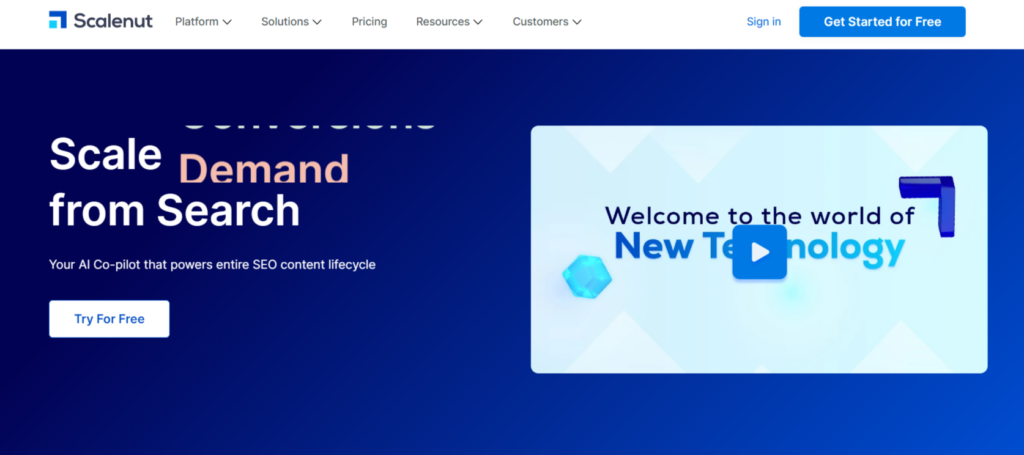
Scalenut might just be the go-to Writesonic alternative if you desire quality content without doing all the heavy lifting yourself. Not only is it great for outsourcing individual articles, but it is also perfect for managing large-scale projects.
Scalenut Key Features and Benefits
Scalenut boasts an impressive number of fantastic features that make it stand out as a writing tool:
- Quality Control: One considerable advantage is its commitment to quality control. With professional writers across various niches, Scalenut ensures your content is written to your specifications and passes rigorous quality checks before submission.
- Large-Scale Project Management: This platform facilitates the management of bulk orders smoothly. You can conveniently track progress, assess results, and provide feedback – all in one place.
- Budget Friendly: The competitive pricing makes it easier on your pockets. Whether you’re a small business or a big company, there’s a plan to match your needs.
- Excellent Customer Support: With responsive customer support round-the-clock, issues are addressed swiftly, ensuring smooth operations.
Remember, these aren’t mere bullet points; each feature provides tangible benefits leading to time efficiency and cost savings while promising superior content output.
Scalenut Use Cases
The versatility of Scalenut extends from individuals looking to outsource their blogs or social media posts right up to corporations requiring hundreds of product descriptions or email sequences at scale:
- Bloggers can take a break while maintaining their post frequency with high-quality content.
- Corporates can efficiently manage large-scale writing tasks such as web copy revisions or product descriptions.
- Marketing teams can utilize it for planning and executing advertisement campaigns.
No matter the use case, outsourcing work using Scalenut frees up valuable time, which can then be invested into other core business functions.
Scalenut vs Writesonic: 3 Key Differences
Transitioning into directly comparing Scalenut and Writesonic, three differences can be highlighted:
- Human vs AI: Unlike Writesonic, an AI-based writing tool, Scalenut employs real-life content writers to create articles, ensuring a natural human touch to the text.
- Pricing: Costs with Scalenut can sometimes be more economical, mainly when dealing with bulk requirements, making it favorable in budget terms.
- Project Management: Scalenut stands apart from Writesonic in facilitating end-to-end project management – from assigning tasks to assessing results to providing revisions – something that automation tools aren’t designed for.
Though each platform has strengths and weaknesses, your choice should reflect your content goals and working style.
Wordtune – Favorite for Refining Written Text

Wordtune stands out among the Writesonic alternatives as a robust tool primarily designed to enhance and refine your written text. Let’s explore its key features, benefits, usability scenarios, and how it compares with other Writesonic competitors.
Wordtune Key Features and Benefits
With Wordtune at your disposal, you achieve clear, authentic, and precise communication, not just a mere collection of sentences with correct grammar. Here’s an overview of what you can anticipate:
- Full-Sentence Rewriting: This content enhancement tool assists in rewriting your whole sentence while maintaining the original sentiment.
- Smart Editor Suggestions: The smart editor provides synonyms or alternative phrases for more effective writing.
- Language Tone Adjustment: Adjust the tone from formal to casual (or vice versa) without losing its original meaning.
- Comprehensive Writing Assistance: Provides assistance whether you’re drafting emails and reports or crafting compelling copy for your website.
Undoubtedly, these tools provide immense benefits by delivering an engaging reader experience through organized thoughts and clarity of message.
Wordtune Use Cases
- For Content Writers – Wordtune thrives as a handy assistant in refining sentences while safeguarding their original meanings, allowing authors to produce efficient copies seamlessly.
- For Non-Native English Speakers – It simplifies professional communication by suggesting suitable phrases, ensuring language appropriateness. This feature is particularly useful where English is utilized as a second language.
- For Marketing Professionals – The tool is handy when shaping brand narratives or fine-tuning ad copies. It ensures conveying messages appropriately aligned with target audiences’ needs and preferences.
In essence, anyone looking to polish their writing will find Wordtune immensely valuable, whether tweaking day-to-day email communication or enhancing vital marketing campaigns.
Wordtune vs Writesonic: 3 Key Differences
When comparing Wordtune to Writesonic and other AI writing tools, several key differences emerge:
- Content Refinement Capabilities: Wordtune excels at revising and refining an existing message. At the same time, Writesonic is more geared towards generating fresh content.
- Tone Adjustments: Wordtune facilitates customization of text tone based on the context. It’s a feature noticeably lacking in many other alternatives.
- Use for non-native speakers: Non-native English speakers find Wordtune’s phrase suggestion immensely helpful, although this unique facet isn’t as prominent among its competitors.
Wrapping up, Wordtune carves out its niche among Writesonic alternatives, especially when precision, clarity, and language tailoring are paramount needs. Whether you’re revising drafts or finessing final copies, Wordtune is a useful companion steering your writing to reach heights of proficiency!
FAQ on Writesonic alternatives
Delving deeper into the world of AI-powered content generators, you might still have some lingering questions. Let’s dive into some frequently asked queries about Writesonic.
What is similar to Writesonic?
Writesonic, with its robust set of features for content creation, has several worthy contenders that compete on the same playing field. These include SEOwind, best known for creating SEO-optimized articles; Anyword for data-driven copywriting; globally applauded Grammarly for grammar enhancements; and Jasper AI, renowned for generating creative content effortlessly. Others include Rytr, ideal for high-volume quality content production, and Wordtune, loved by many writers striving to refine their written text.
Can you use Writesonic for free?
Writesonic introduces a free pricing plan for hobby projects. You can write 10,000 words per month.
How good is Writesonic?
Regarding user experience, feedback about Writesonic hovers somewhere between satisfactory and exceptional. Appreciated widely by professionals from diverse industries, this platform stands tall as a luminary among automated writing software. Its strength lies within its deep learning algorithms and in an intuitive interface supporting seamless navigation even by non-tech-savvy users, making it friendly to beginners and seasoned experts alike.
What model does Writesonic use?
At the heart of Writesonic beats, GPT-4 is arguably the most advanced language processing algorithm engineered by OpenAI today. By leveraging this breakthrough technology that understands context like no other AI, Writesonics delivers human-like text generation capabilities, from crafting catchy email subject lines to fleshing out long-form blog articles brimming with cogency and specificity. Its model can adapt to multiple writing styles, making it the perfect companion for all your content needs.
Which is better, Copysmith, Writesonic, Frase, or SEOwind?
Choosing between Copysmith, Writesonic, Frase, and SEOwind can seem daunting. Each offers unique benefits suited for varied writing needs. Here’s a brief comparative analysis to support you in making an informed decision.
Firstly, let’s consider Copysmith. This platform shines due to its sleek user interface and AI-powered features that excel at creating various types of marketing copies. However, it has limitations when dealing with long-form content such as articles or blog posts.
Moving onto Writesonic, it promises versatility with both short-form copywriting and long-form article generation capabilities. It also includes a built-in grammar checker and tone-adjustment feature. Nevertheless, its language generation model might sometimes require manual polishing for more refined content.
Next up is Frase, which stands out for using advanced AI capabilities that allow detailed SERP analysis besides generating content – something especially needed if SEO-focused writing is your primary concern. That said, I’ve noticed it tends to veer towards informational instead of persuasive writing style.
Last but by no means least is SEOwind, which makes a strong case for those specifically focusing on SEO-optimized articles. Its strength lies in generating high-quality content enriched with top-ranking keywords identified via robust keyword analysis tools that can help improve organic search visibility.
So, how do we choose then? The ultimate selection comes down to the specific requirements of your projects: If crisp ad copy holds precedence over everything else – turn to Copysmith. Writesonic would be your best bet for diverse content types and grammar checks. Choose Frase, where extensive SERP analytics complemented by quality content creation is necessary. At the same time, those needing articles primed for stellar organic search performance should opt for SEOWind.
Remember, there’s no one-size-fits-all solution here – each has its strengths aimed at specialized areas. Understand your requirements deeply, take advantage of their free trials, and always keep exploring to find the perfect match for your unique writing needs.
